This lesson focuses on the foundational 'priority to the right' rule, a key concept in the Dutch driving theory test for category B. It builds upon basic understanding of road signs and intersections, preparing you for more complex priority situations covered later in this unit.
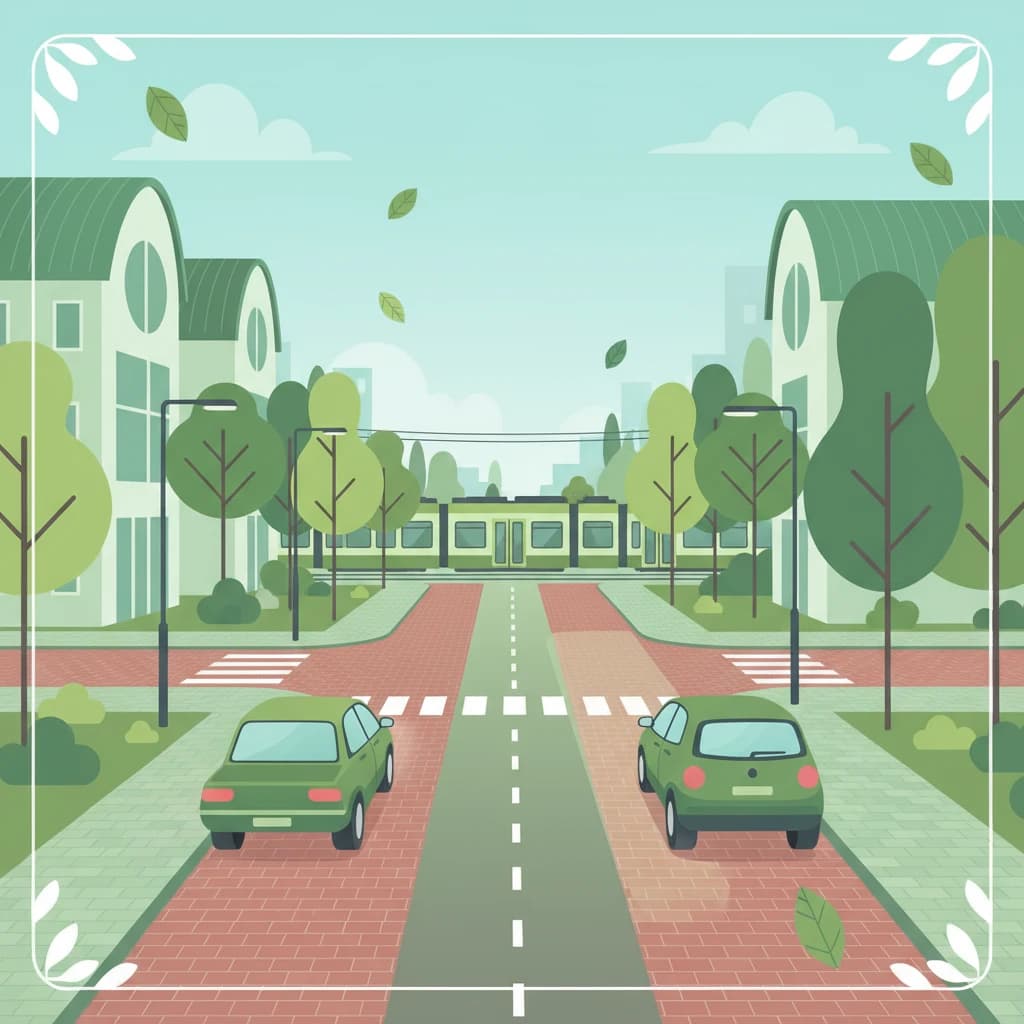
Navigating intersections safely is a cornerstone of responsible driving in the Netherlands. This lesson delves into the fundamental "priority to the right" rule (recht van de weg), a critical concept for all drivers, especially when encountering unmarked junctions or complex traffic situations. Mastering this rule and its exceptions is essential for the Dutch driving license B theory exam and for ensuring safety on the road.
Priority to the right is the default rule governing right-of-way at intersections in the Netherlands where no other signs or road markings explicitly dictate who has priority. It means that traffic approaching from your right side has the right-of-way, and you must yield to them. This rule is foundational for safe navigation, particularly in residential areas, city streets, and rural roads where signage might be minimal.
The "priority to the right" rule only applies at "equal-priority intersections." These are junctions where two or more roads meet, and none of them are designated as having explicit priority by traffic signs or road markings. Common examples include:
It's crucial to correctly identify these intersections because other types of junctions, such as roundabouts or those with B1 (Priority Road) or B6 (Stop) signs, operate under different rules.
When approaching an unmarked, equal-priority intersection, you must actively scan for traffic from your right. If a vehicle is approaching from your right, you are legally obliged to yield to it. This means slowing down, preparing to stop if necessary, and allowing the vehicle from your right to proceed first. Only when the path is clear can you continue your journey.
Always assume the "priority to the right" rule applies unless there is a clear sign or marking indicating otherwise. This cautious approach helps prevent accidents and ensures compliance with Dutch traffic regulations (RVV).
Example: Imagine driving down a residential street. You approach a T-junction with no traffic signs or road markings. A car is approaching the same junction from the street on your right. According to the priority to the right rule, you must yield to this car, allowing it to pass before you proceed.
While "priority to the right" is the general rule, there are several crucial exceptions in Dutch traffic law that override it. Understanding these exceptions is just as important as knowing the rule itself, as misinterpreting them can lead to dangerous situations and legal penalties.
When a vehicle exits a driveway, a private road, or any non-public access point (like a parking lot exit) onto a public road, that vehicle must yield to all other traffic on the public road, regardless of whether that traffic is coming from the left or the right. The default "priority to the right" rule does not apply in this scenario.
Vehicles exiting a driveway or private land are considered to be "entering traffic" and must yield to all traffic already on the public road. This means they do not have priority over vehicles approaching from their right on the main road.
Vehicles transitioning from an unpaved road (such as a dirt track, gravel path, or field entrance) to a paved public road must yield to all traffic on the paved road. The "priority to the right" rule does not apply here either. This exception acknowledges that unpaved roads often have poorer visibility and different surface conditions, making it safer for traffic on the main paved road to have priority.
Example: You are driving a car on a paved road. To your right, a car is about to enter the paved road from a gravel path. Even though the car is on your right, you have priority because it is coming from an unpaved road.
In the Netherlands, trams hold a special status in traffic. A tram always has priority over other vehicles at an intersection or crossing, regardless of whether it's coming from your right or left, and even if there are no specific signs indicating tram priority. This rule is designed to ensure the safety and smooth flow of public transport.
This rule applies even if the tram track appears to be "less important" than the road you are on. Always be vigilant for trams, especially in cities with extensive tram networks.
While less common, certain emergency vehicles (with flashing lights and sirens) or other special vehicles may override standard priority rules. Additionally, specific temporary situations like roadworks or police instructions can alter priority. Always be attentive to these dynamic factors.
The ability to quickly and accurately identify the type of intersection and any relevant priority signage is fundamental to applying the correct right-of-way rule. Misidentification is a common cause of accidents.
An intersection is any place where two or more roads meet or cross. However, not all intersections are "equal-priority" junctions where "priority to the right" applies.
B1 sign): Indicates you are on a priority road. Traffic joining or crossing from side roads must yield to you.B3 sign) or Shark Teeth markings: Indicates you must yield to all traffic on the intersecting road.B6 sign): Requires you to come to a complete stop before the stop line and yield to all traffic.Road markings, such as "shark teeth" (triangles painted on the road pointing towards you), often complement traffic signs by indicating a yield obligation. Even if you miss a B3 sign, the shark teeth on the road should alert you to yield. Pay attention to the road surface as much as the signs.
The rules regarding right-of-way, including "priority to the right," are enshrined in the Dutch Road Traffic Regulations (Reglement Verkeersregels en Verkeerstekens 1990, RVV 1990), specifically in Article 12, among others. These are not merely guidelines but legally binding mandates.
Ignoring priority rules, such as failing to yield to traffic from the right or failing to stop for a tram, can lead to severe consequences:
Driving conditions, vehicle types, and the environment can all influence how you apply priority rules. Safe driving requires adapting your behavior to these variations.
Signaling your intentions, even when yielding, can greatly improve safety. While not always legally required when yielding, a clear signal helps other drivers understand your planned movements and reduces confusion.
Good drivers anticipate potential conflicts. At every intersection, ask yourself:
By consistently asking these questions, you adopt a defensive driving posture, significantly reducing the risk of accidents.
The "Priority to the Right and Left" lesson emphasizes the core principles for navigating intersections in the Netherlands:
B1 Priority Road, B3 Yield, B6 Stop) and road markings (shark teeth) that explicitly define priority, overriding the default right-hand rule.By consistently applying these principles, you contribute to a safer road environment for everyone and demonstrate your competence as a driver.
Lesson content overview
Explore all units and lessons included in this driving theory course.
Explore search topics learners often look for when studying Priority to the Right and Left. These topics reflect common questions about road rules, driving situations, safety guidance, and lesson level theory preparation for learners in the Netherlands.
Browse additional driving theory lessons that cover connected traffic rules, road signs, and common driving situations related to this topic. Improve your understanding of how different rules interact across everyday traffic scenarios.
Learn about critical exceptions to the standard priority to the right rule. Understand how to navigate situations involving driveways, unpaved roads, and the absolute priority of trams in the Netherlands.
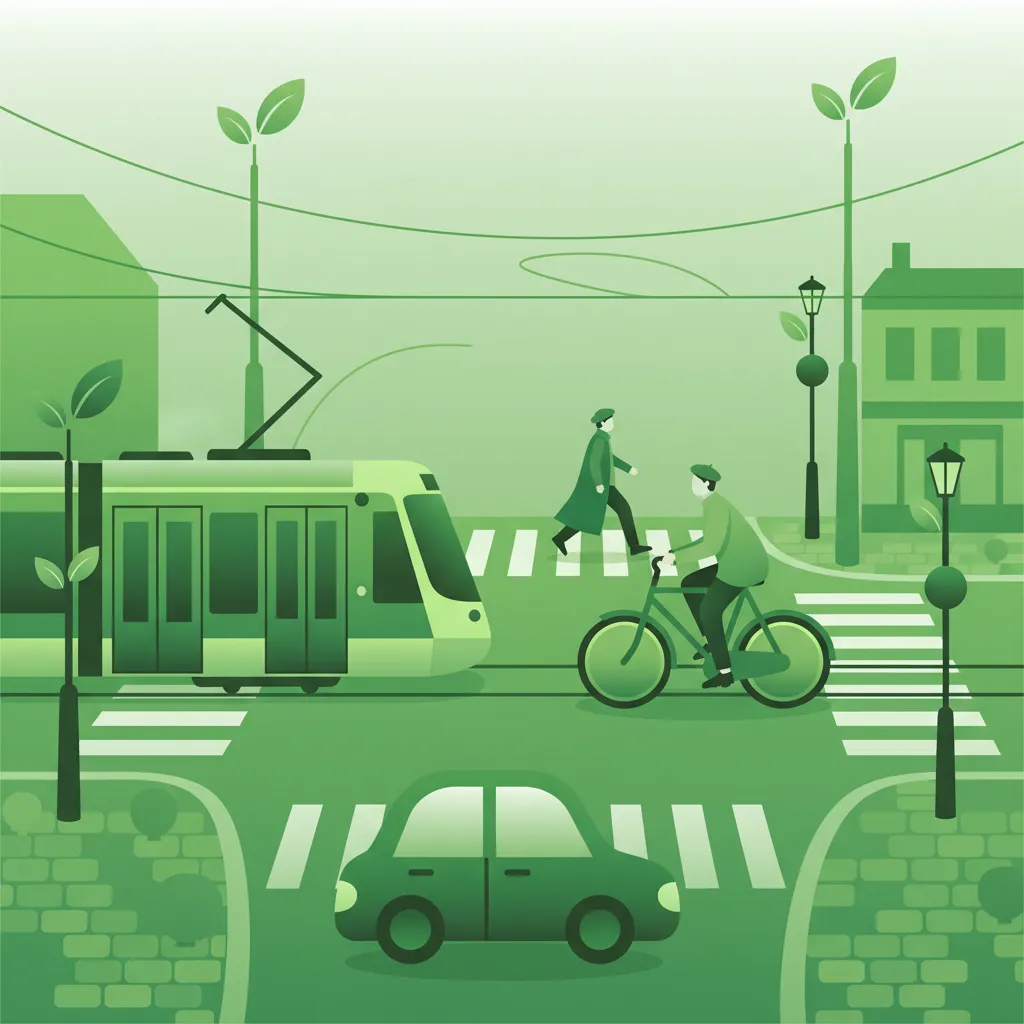
This lesson addresses special situations where standard priority rules are superseded. You will learn the absolute priority of emergency vehicles using sirens and flashing lights, and the correct procedure for giving them way safely. The content also explains the specific priority rules for trams, which often have right-of-way over other traffic, as well as for military columns and official funeral processions. Furthermore, the lesson reinforces the rules for yielding to pedestrians at designated zebra crossings.

This lesson addresses the unique priority rules concerning trams in urban environments, clarifying that trams generally have priority unless signs or signals indicate otherwise. It explains the specific hazards motorcyclists face, such as slippery tracks (especially in wet conditions) and the long stopping distance of trams. Riders will learn how to safely cross tram lines, navigate shared lanes, and correctly interpret tram-specific traffic signals to avoid dangerous conflicts.
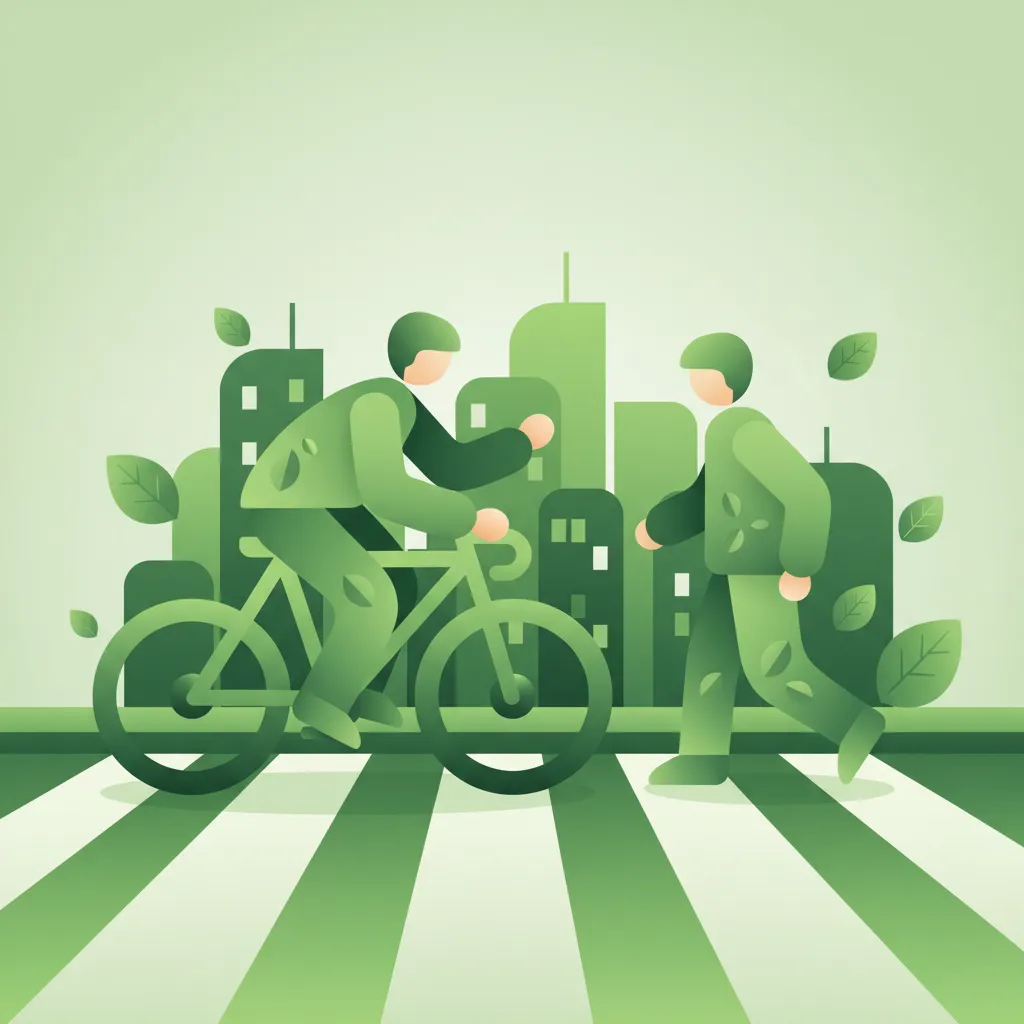
This lesson explains the critical rules of priority involving pedestrians and cyclists to ensure the safety of vulnerable road users. You will learn the absolute requirement to stop for pedestrians on or waiting to use a 'zebrapad' (zebra crossing). The content also covers situations where you must yield to cyclists crossing your path, such as when turning across a dedicated bicycle lane (fietspad).
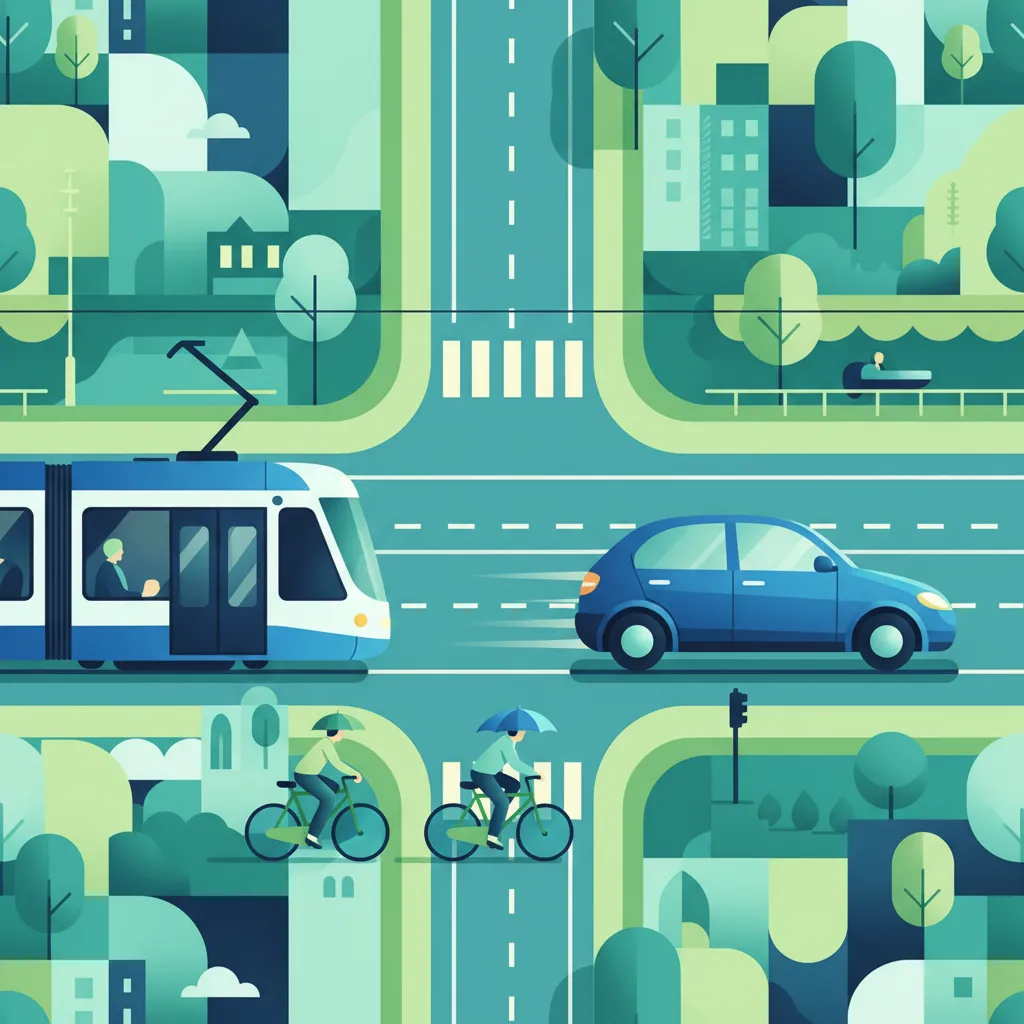
This lesson introduces the foundational principles of right-of-way in the Netherlands, starting with the road user hierarchy and the default rule of giving priority to traffic from the right at equal intersections. You will learn to identify a priority road, marked by sign BORD 30, and understand how this designation overrides the default rule. The content establishes the legal framework for making priority decisions in the absence of specific signs or signals.

This lesson breaks down the rules of priority at intersections. You will learn to identify an 'equal' intersection where the default rule of giving way to traffic from the right applies. It also explains how priority is regulated by signs (such as the B6 Stop sign and B7 priority road sign) and road markings ('shark's teeth'). Understanding these hierarchies is crucial for making safe and correct decisions when crossing or turning at any junction.

This lesson establishes the foundational rule of priority in Dutch traffic law: yielding to traffic from the right at intersections of equal roads unless otherwise indicated. It explains how to identify an unmarked or 'equal' junction and the correct procedure for approaching, assessing, and proceeding safely. The content also introduces the primary signs and markings, such as 'shark's teeth,' that override this default rule, forming the basis for all other priority scenarios.
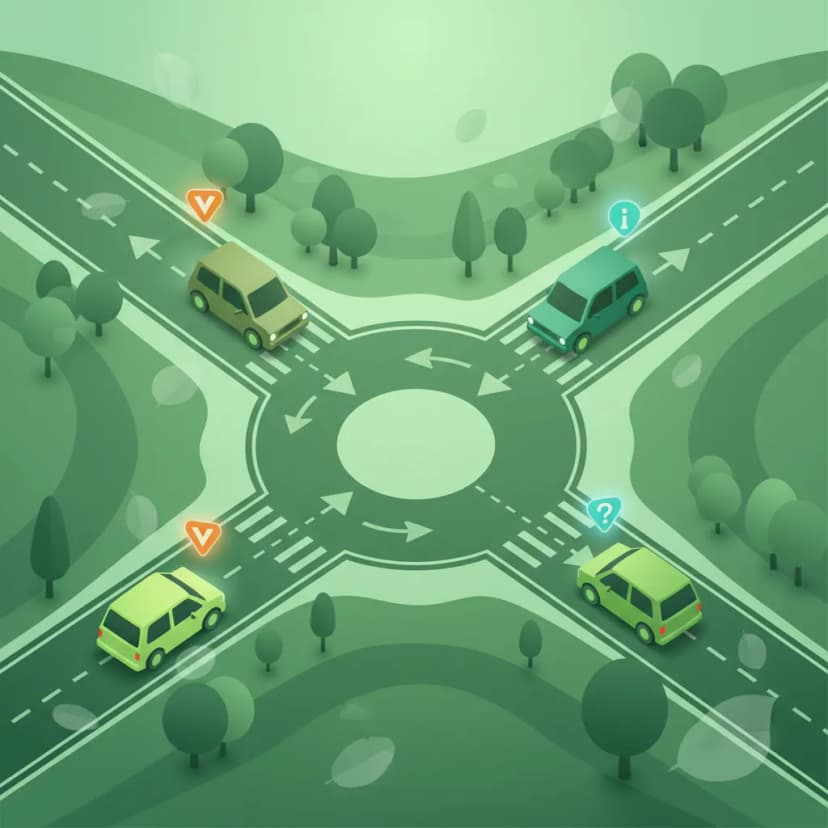
This lesson addresses the challenge of navigating equal-priority intersections, where no signs or markings dictate the right-of-way. You will master the fundamental Dutch traffic rule of giving priority to all drivers approaching from your right ('rechts voor'). The content focuses on developing advanced observational skills and clear communication to safely manage these situations, which are common in residential and urban areas.
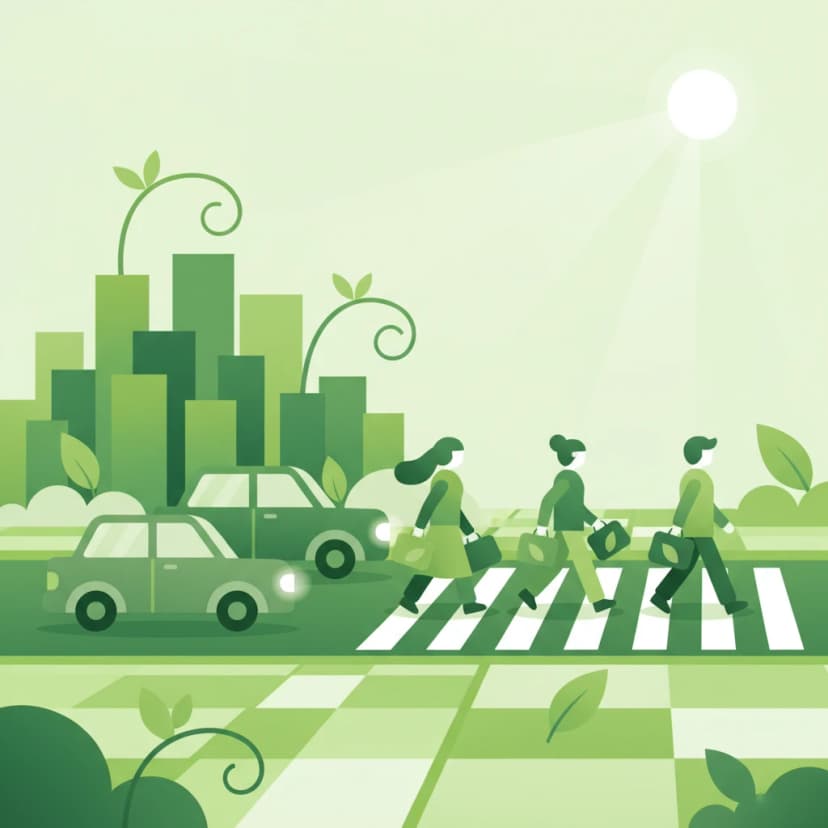
This lesson focuses on the rules governing interactions with pedestrians. You will learn the absolute requirement to stop for pedestrians who are on or clearly intending to cross at a designated zebra crossing. The curriculum also covers how to share the road in a 'woonerf' (home zone) where pedestrians have priority. It emphasizes being particularly cautious around children, the elderly, and disabled pedestrians, who may require more time or behave unpredictably.
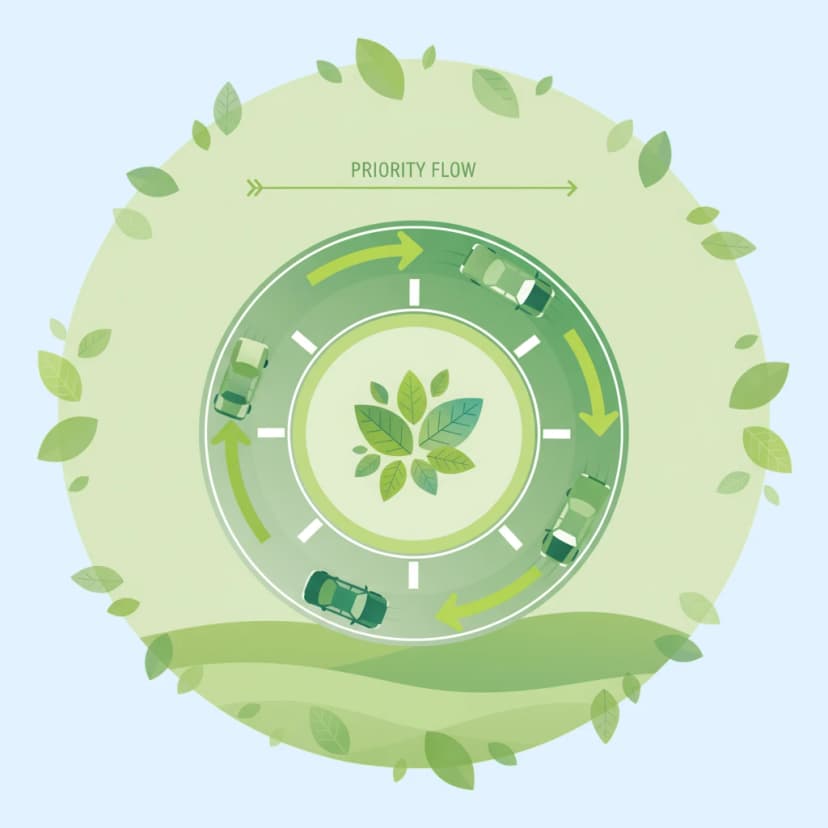
This lesson provides a detailed guide to navigating roundabouts (rotondes) in the Netherlands. You will learn the primary rule: drivers approaching a roundabout must yield to traffic already circulating on it, which is typically indicated by yield signs (B5) and shark teeth. The curriculum also covers the correct use of turn signals when entering and exiting, rules for multi-lane roundabouts, and special considerations for the priority of cyclists who may have a dedicated path around the roundabout. Correct roundabout etiquette is key to maintaining traffic flow and safety.

Riding in Dutch cities often means interacting with trams, which present unique risks for two-wheeled vehicles. This lesson details the absolute priority that trams have in most situations and explains how to interpret specific tram traffic signals. It provides crucial safety techniques for crossing tram tracks at a safe angle to prevent your wheels from getting stuck and emphasizes maintaining a safe distance from moving trams, which is a vital aspect of urban hazard perception.
Master the art of navigating unmarked intersections where the 'priority to the right' rule applies. This lesson focuses on identifying these junctions and safely yielding to traffic from the right in complex urban and rural scenarios.

This lesson breaks down the rules of priority at intersections. You will learn to identify an 'equal' intersection where the default rule of giving way to traffic from the right applies. It also explains how priority is regulated by signs (such as the B6 Stop sign and B7 priority road sign) and road markings ('shark's teeth'). Understanding these hierarchies is crucial for making safe and correct decisions when crossing or turning at any junction.

This lesson addresses the challenge of navigating equal-priority intersections, where no signs or markings dictate the right-of-way. You will master the fundamental Dutch traffic rule of giving priority to all drivers approaching from your right ('rechts voor'). The content focuses on developing advanced observational skills and clear communication to safely manage these situations, which are common in residential and urban areas.

This lesson establishes the foundational rule of priority in Dutch traffic law: yielding to traffic from the right at intersections of equal roads unless otherwise indicated. It explains how to identify an unmarked or 'equal' junction and the correct procedure for approaching, assessing, and proceeding safely. The content also introduces the primary signs and markings, such as 'shark's teeth,' that override this default rule, forming the basis for all other priority scenarios.

This lesson introduces the foundational principles of right-of-way in the Netherlands, starting with the road user hierarchy and the default rule of giving priority to traffic from the right at equal intersections. You will learn to identify a priority road, marked by sign BORD 30, and understand how this designation overrides the default rule. The content establishes the legal framework for making priority decisions in the absence of specific signs or signals.

This lesson focuses on the array of signs used to manage traffic at intersections and along multi-lane roads. You will learn to interpret overhead gantry signs, lane designation signs, and markings that guide drivers into the correct lane for their intended direction. The curriculum covers signs indicating priority at upcoming junctions, such as the B3 and B4 signs, which clarify right-of-way rules in complex scenarios. Proper interpretation of these signs is essential for smooth lane changes, efficient navigation, and preventing conflicts at junctions.

This lesson addresses special situations where standard priority rules are superseded. You will learn the absolute priority of emergency vehicles using sirens and flashing lights, and the correct procedure for giving them way safely. The content also explains the specific priority rules for trams, which often have right-of-way over other traffic, as well as for military columns and official funeral processions. Furthermore, the lesson reinforces the rules for yielding to pedestrians at designated zebra crossings.
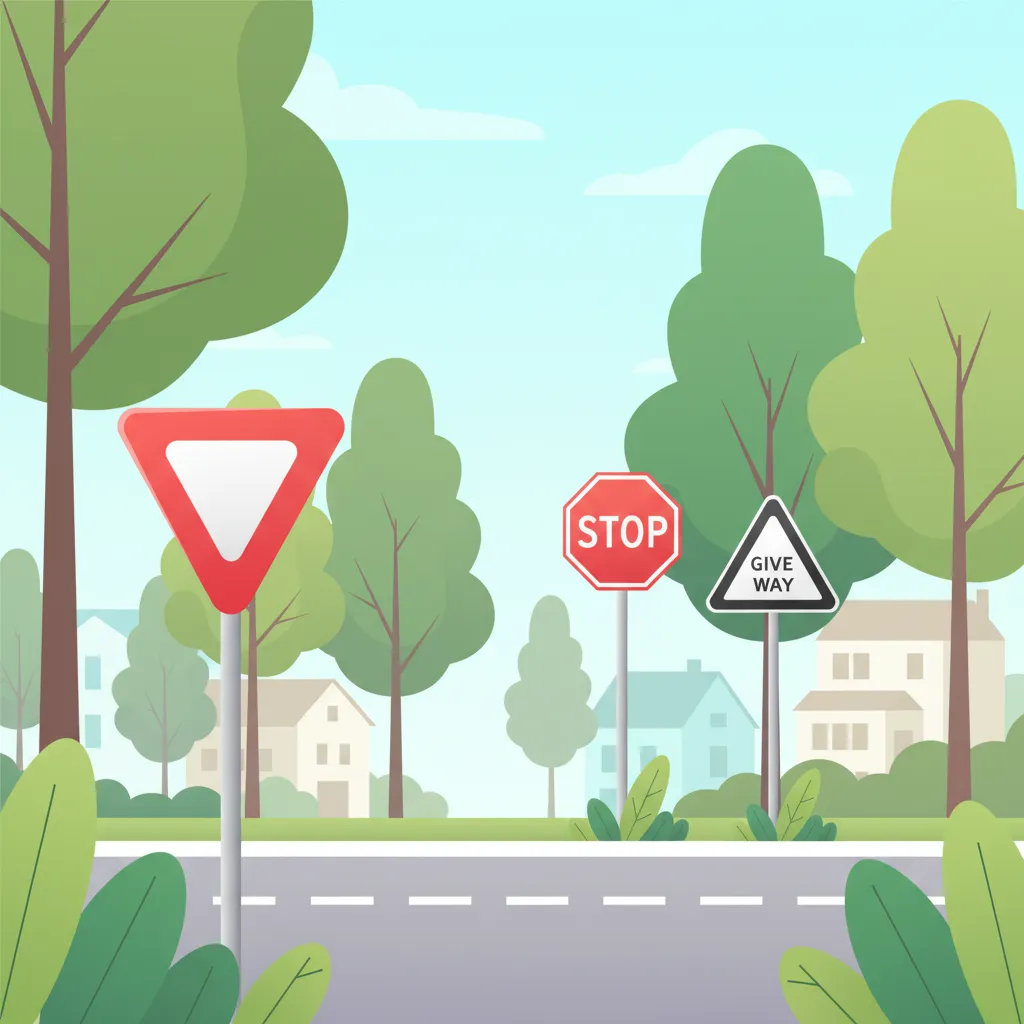
This lesson details the function of signs and markings that explicitly assign priority at intersections. You will learn the difference between the B5 yield sign, which requires giving way to intersecting traffic, and the B6 stop sign, which mandates a complete stop before proceeding. The content also covers the 'haaientanden' (shark teeth) road markings, which function similarly to a yield sign. Understanding how these signs interact with priority road signs (B1) is essential for correctly navigating controlled intersections.

This lesson provides a detailed guide to navigating roundabouts (rotondes) in the Netherlands. You will learn the primary rule: drivers approaching a roundabout must yield to traffic already circulating on it, which is typically indicated by yield signs (B5) and shark teeth. The curriculum also covers the correct use of turn signals when entering and exiting, rules for multi-lane roundabouts, and special considerations for the priority of cyclists who may have a dedicated path around the roundabout. Correct roundabout etiquette is key to maintaining traffic flow and safety.

This lesson focuses on the rules governing interactions with pedestrians. You will learn the absolute requirement to stop for pedestrians who are on or clearly intending to cross at a designated zebra crossing. The curriculum also covers how to share the road in a 'woonerf' (home zone) where pedestrians have priority. It emphasizes being particularly cautious around children, the elderly, and disabled pedestrians, who may require more time or behave unpredictably.

This lesson explains the critical rules of priority involving pedestrians and cyclists to ensure the safety of vulnerable road users. You will learn the absolute requirement to stop for pedestrians on or waiting to use a 'zebrapad' (zebra crossing). The content also covers situations where you must yield to cyclists crossing your path, such as when turning across a dedicated bicycle lane (fietspad).
Find clear answers to common questions learners have about Priority to the Right and Left. Learn how the lesson is structured, which driving theory objectives it supports, and how it fits into the overall learning path of units and curriculum progression in the Netherlands. These explanations help you understand key concepts, lesson flow, and exam focused study goals.
The 'priority to the right' rule applies at intersections of roads of equal importance where there are no traffic lights, no priority signs (like a yield or stop sign), and no road markings (like 'shark teeth') indicating otherwise. In such cases, you must always give way to traffic coming from your right.
Yes, several exceptions exist. You do not need to give priority to the right if you are exiting a private driveway, a unpaved road, or a parking area onto a paved road. Also, trams always have priority, regardless of which side they are on.
Trams have a special priority status in the Netherlands. Even if the tram is on your left, you must always give way to it. If the tram is on your right and approaching the intersection, you must yield to it as well, as it has priority over all other traffic.
In a 'woonerf' (residential yard), there are usually signs indicating it's a woonerf and often a 15 km/h speed limit. While general traffic rules might seem to apply, the woonerf is primarily for residents, and you must drive very slowly and carefully, being mindful of pedestrians and cyclists. The priority rules can be less straightforward and the focus is on extreme caution, not strict right-of-way.
If the car on your right is also waiting, it implies they are acknowledging your priority or are unsure. However, always exercise caution. It's better to make brief eye contact or a slight gesture if safe to do so, but never assume. If you have clear right of way, proceed cautiously. If in doubt, wait for them to go or for the situation to become clearer.